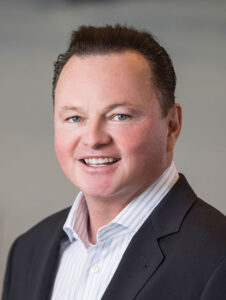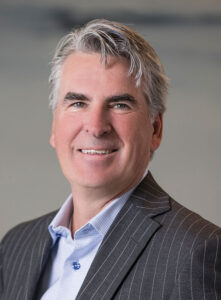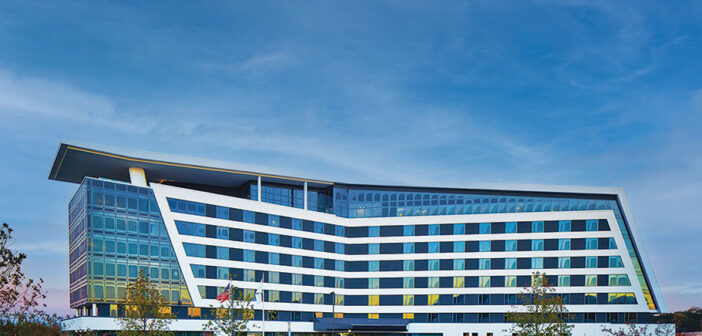When industry veteran Tim Muir joined TPG Hotels, Resorts and Marinas (TPG), a wholly owned subsidiary of Procaccianti Companies, as chief development officer last July, he was charged with expanding the company’s portfolio through third-party management relationships and management company acquisitions.
Roughly six months later, TPG has acquired third-party management company Marshall Hotels & Resorts, which specializes in operating three- and four-star branded properties. Following the transaction, the companies have merged.

The acquisition of Marshall Hotels and Resorts is representative of the types of transactions key to achieving our aggressive growth plans. —Tim Muir TPG Hotels, Resorts & Marinas
“The acquisition of Marshall Hotels and Resorts is representative of the types of transactions key to achieving our aggressive growth plans,” said Muir. “The combined companies’ high-level talent and deep bench enable TPG Hotels, Resorts & Marinas to be extremely competitive when pursuing third-party management business. We have absolutely no doubt that this acquisition puts TPG at or near the top of a very short list of highly qualified management firms with the depth and resources to deliver top performance for all types of hospitality owners and ownership groups.”
Mike Marshall, president/CEO, Marshall Hotels & Resorts, now serves in the same role for TPG. The combined company will eventually get a new name that has yet to be determined.
“I think that will take a bunch of time,” said Robert Leven, chief investment officer, Procaccianti Companies | TPG Hotels, Resorts & Marinas, of the decision of the new name. “There are so many integration things that are a super-priority just to operate every day as a combined company. The name, we’ll get to it over time, but it’ll probably take a bit.”
He noted that TPG had been looking for ways to grow its management platform for a long time, adding, “We’ve been selectively in the third-party business in one-off, two-off, relationship-oriented-type situations. But, I think it’s become clear that it’s pretty hard to get into the third-party business on a one-by-one basis.”

The goal for us was really to be able to have a management business where we could maintain a level of growth and size. —Rob Leven Procaccianti Companies | TPG Hotels, Resorts & Marinas
The acquisition and appointment of Marshall as president/CEO allows Elizabeth A. Procaccianti, COO, Procaccianti Companies, to hand over the leadership reins of the management company.
“[She’s] certainly not retiring, but I think she was looking for the ability to step out of that day-to-day role of running the management company and still stay involved,” said Leven. “She’s working with Mike very closely, but this will allow her to do other things on the asset management side of our business and some other areas where her skill set can really be maximized. So, it was a real alignment of the stars in terms of the things that we were looking for in a transaction.”
Before the acquisition, TPG operated a portfolio of approximately 50 hotels, with a vast majority of them being their own properties. Expanding the third-party management business had been difficult, hence the hiring of Muir, who had worked with Leven and his father Mike at U.S. Franchise Systems.
“Because we weren’t thought of by many people in the industry as a third-party operator, that made it all the more difficult to try to make headway,” said Leven. “The goal for us was really to be able to have a management business where we could maintain a level of growth and size. That way, you’re able to really maintain and invest in resources, both regular resources and human resources, and you’re not in this constant churn of going up and down like a yo-yo.”
Muir was the right person to help TPG in that area because “he has been around the industry a long time [and has]lots of relationships and contacts as one of the better sales guys you’ll run into in this business,” Leven pointed out. “We charged him with trying to identify companies that would be interested in merging or selling, in some fashion or form putting the resources together so that we could accomplish our goals and create a bigger, more fluid platform.”
So, TPG set out to identify management firms to acquire, although it was not the only company doing so, according to Leven.
“I think a lot of people have looked to consolidate to grow—consolidate and share resources to try to get their platform to a point where it’s big enough and sustainable that they could maximize the organization and resources,” he said.
It was Muir who connected with Marshall to put out feelers for a deal. “I’ve known Mike Marshall for 30 years, so I knew that the DNA and core principles of his business were very similar to [that of]TPG,” he said. “We’re both family businesses. We’ve been in business for about 65 years, they’ve been in business for more than 40 years. So, I just reached out and called him.”

So, we were looking for someone who we could join up with that offered better properties, better ownership groups and the chance to acquire better talent.” —Mike Marshall TPG Hotels, Resorts & Marinas
Leven said that Marshall was a good fit for two reasons, the first being the company’s substantial size (the deal increased TPG’s portfolio to more than 130 operated properties in 26 states).
“Secondly, they’re a 100% third-party management company,” he said. “So, it gives us not only instantaneous size and scale, but it also puts us instantly into a majority third-party managed company. The size was interesting, and then the third-party makeup of the business allowed us to, in one fell swoop, shift our portfolio.”
For Marshall, who has worked in the industry for more than 30 years, the deal will allow him to “maybe have some fun [operating hotels]again.”
“We were doing the same thing over and over again,” he said. “It was getting stale for us as a company, working with the same types of ownership groups time and time again. So, we were looking for someone who we could join up with that offered better properties, better ownership groups and the chance to acquire better talent. Because, quite frankly, it hasn’t been a whole lot of fun, pandemic aside. It’s been a struggle as a third-party management company for the last five to 10 years, just in the fact that owners have become a lot more demanding and they don’t really know what they’re demanding a lot of times.”
The combined company will be headquartered in Marshall Hotels & Resorts’ hometown of Salisbury, MD, although there will be separate offices for now.
“It’s so difficult to get good employees right now that we’re not requiring anybody to move anywhere,” said Marshall. “If we get a good employee and we can accommodate their needs and their ability to work remotely—work from home or wherever—then we’re going to do that. The fact of the matter is we now have hotels in 25 different states. We need to spread out anyway to make travel easier. Would it be great to have everybody under one roof? Absolutely. But the reality of it is, since 2008, we’ve not been able to do that. There are certain aspects of the company and certain positions that we would like to keep centralized, and we’ll figure that out as we go.”
The combined firm is now one of the biggest management companies in the U.S. in terms of properties and rooms.
Growth plans
Moving forward, Leven said, “We’re going to continue to buy hotels on the ownership side, which the new combined company will manage on behalf of our ownership group. I think we’ll continue as a joint entity to pursue the development of the third-party business, probably in a more expanded and systematic, sophisticated nature. We may approach more institutional investors in the business with opportunities that might come up that we, as a management company, might either third-party manage or do small sliver investments with a 99% owned institutional owner.”
The company is also constantly searching for other management company acquisition opportunities, according to Muir.
“TPG’s portfolio is heavy in New England, the Northeast, the Southeast and Florida, and Mike’s portfolio is really strong in Maryland and Virginia,” he said. “But, there are other parts of the country [where we’d like to be]. We’d love to get someone on the West Coast or in Texas that has a platform.”
He added, “To find a really good regional core management company that we could go in and grow a platform in a region is something that’s very enticing to us. I like to talk to everyone and understand wants and needs and see if there’s a fit. So, I’m talking to more than one management company to get a win-win deal, where it’s good for them and their platform, and it’s good for us.”
Marshall also had some projects brewing before his company was acquired, and expects more to come as the pandemic dies down.
“We still have a pipeline that we’ve had in place that we’re working through,” he said. “But at the same time, we’re picking up a couple of third-party contracts in [February] that had kind of a combined feel that helps be solidified with this joining of forces. We also think that, after all this COVID mess and everything that’s gone on, there’s going to be a tremendous amount of opportunity moving forward. And we really think that we’re going to have our picks of what projects we are going to work on.”
Leven reinforced that the company does not want to “grow just to grow,” adding, “We want to grow with quality properties where we can make an impact and where we can be profitable,” he said. “We don’t do work for free and we want to be somewhat selective about who we partner with and who we align with, even on the third-party management side.”
An opportunity to expand may come when approaching a developer that has taken on the management role as a necessity; for example, “the guys who own 10 hotels or 15 hotels, and they’re really more developers than they are managers,” said Leven.
“They don’t make a lot of money in the managing business anyway at that size, and they prefer to spend their time developing hotels rather than dealing with the stuff you have to deal with running a management company.”
Acquisitions & third-party contracts
TPG has been busy since the fall of 2020 with acquisitions, as well as a couple of third-party management contracts.
The company added the eight-key Sherburne Inn to its Nantucket Resort Collection of historic, upscale properties on Nantucket island in Massachusetts, and the 76-key Cherry Tree Inn in Traverse City, MI.
“A lot of these investments we’ve been making really for the last four or five years have been in the independent, leisure-oriented-destination space, and that’s where we continue to make investments and build a portfolio of those kinds of assets,” said Leven.”We also, on the ownership/investment side, launched a marina platform where we’re actively out in the marketplace acquiring not only hotels with large marinas, but freestanding marinas on their own.”
Two properties were added to the marina platform, Champlins Resort, Hotel & Marina in New Shoreham, RI, and Danford’s Resort, Marina & Spa in Port Jefferson, NY. Each has a lodging component, with the former offering 74 rooms and the latter 92 rooms.
Danford’s, an iconic property on the North Shore of Long Island, is undergoing a resort-wide modernization which includes the lodging and slip reservation systems, and a full renovation of the resort’s guestrooms.
The company at press time was also finalizing the acquisition of three properties in the Florida Keys—the 37-key Fisher Inn Resort and the 37-key Hadley House Resort in Islamorada, and the 44-key Parmer’s Resort on Little Torch Key.
Two properties have signed third-party management contracts with TPG since late 2020: the 234-room AC Hotel Washington DC Convention Center, which is a block away from the Walter E. Washington Convention Center, and, most recently, the 214-key Kimpton Overland Airport Hotel in Atlanta, which overlooks a runway at Hartsfield-Jackson International Airport and the driver development track at the Porsche Experience Center.

AC Hotel Washington DC Convention Center is one block away from the Walter E. Washington Convention Center.
“The Kimpton Overland Airport Hotel is a terrific asset, and we were thrilled at the opportunity to compete for this third-party management assignment,” said Muir. “I was confident that once we had a ‘seat at the table,’ the property owners and their advisors would recognize and appreciate the caliber of talent, expertise and fully integrated management platform that TPG Hotels, Resorts and Marinas brings to bear.”
Marshall Hotels & Resorts, too, had been busy before the deal. “We had quite a few new property developments that were already signed,” said Marshall. “We probably have five or six hotels that we’re going to be opening in the next four to six months. We just signed a third-party agreement in the Poconos that we’ve been working on for two years. A lot of this third-party stuff you’re working on literally for years until it comes to fruition; in just our pipeline alone, there’s probably six to 10 hotels that we’ll sign this year that were already in process.”
Looking to the future
So, what does the future hold for the combined TPG-Marshall company? Ralph Izzi, who has spent more than 16 years as VP, corporate marketing & public affairs, Procaccianti Companies, knows where TPG came from and has a strong sense of where its going.
“There was a time when I first started, when we picked up two or three hotels at once and it was not as smooth a transition as they have been over the recent years, just because we’ve gotten so good at it,” he said. “After doing nearly 200 transactions, we’re pretty good at this stuff. I think with the Marshall transaction, once we got past the really difficult stuff of how we blended it all together, there was an alignment of cultures. I think that’s when we realized that was the right time for us to make the move into this business in such an aggressive manner. And now that we’ve gone through this, it’s just like anything else: the more of these we do, the easier and better we’ll get at these transitions and absorbing and merging these companies together.”
Leven, who has been with the organization for more than 20 years, has a plan in mind, one that includes growth but, again, not just for growth’s sake.
“It’s not necessarily the goal to be 500 hotels under management,” he said. “I want to grow profitably and strategically, and I want to have a company five years from now where we have best practices across the board through the entire organization, because that means we have a really profitable management company. We can hire great people and compensate them really well, and we can deliver that value to our owners. I think that’s really the goal.”




